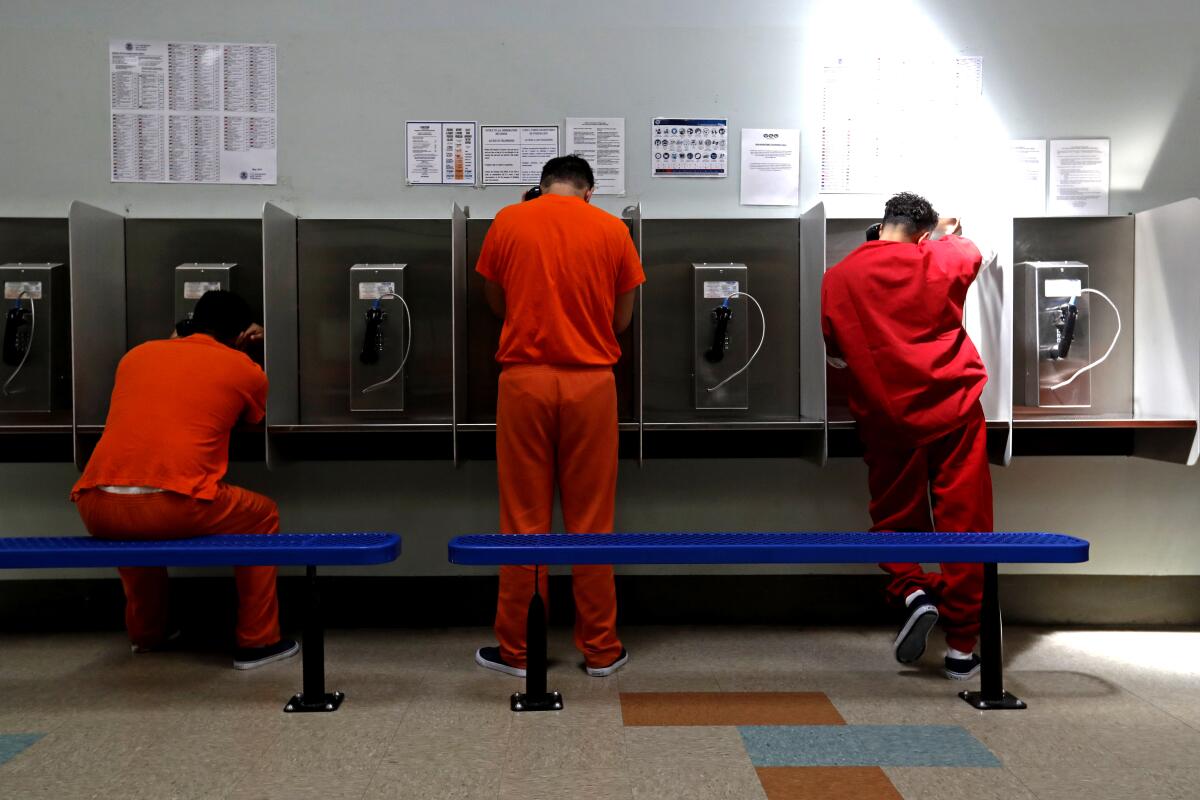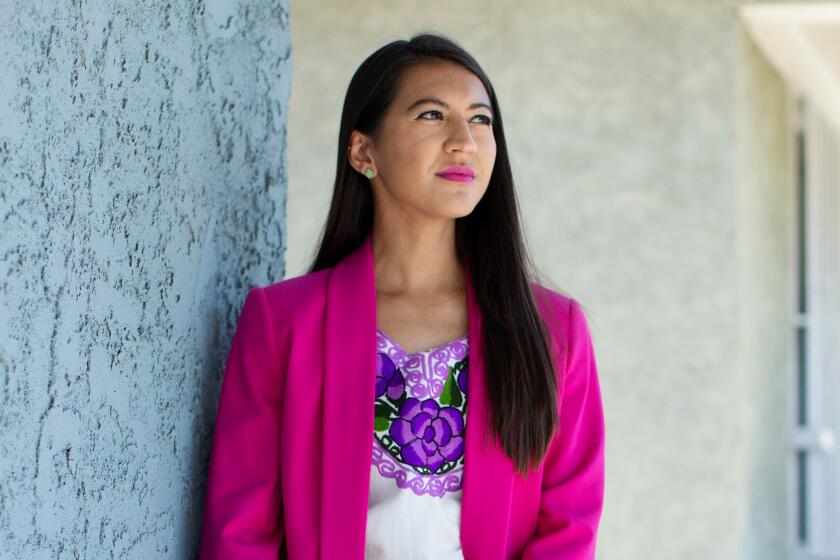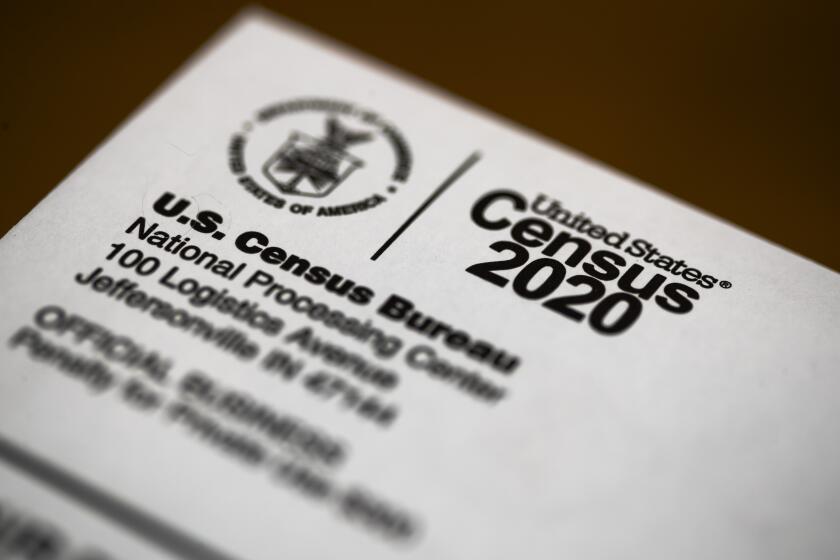Column: Stop dividing immigrants into the ‘good’ vs. the ‘bad.’ They all deserve due process

- Share via
One of the country’s most ingrained and destructive tropes about immigrants is on display in a Los Angeles City Council debate this month: There are good immigrants and there are bad immigrants.
The bad ones are the rapists, the criminals, the “bad hombres,” who deserve to be deported without a second thought.
The good ones are those who work harder than everyone else: the “Dreamers,” “essential workers,” and other superheroes who hold us up. In theory, they deserve protection. In practice, they’re exploited and expelled, too — reduced, like the “bad hombres,” to caricatures.
Opinion Columnist
Jean Guerrero
Jean Guerrero is the author, most recently, of “Hatemonger: Stephen Miller, Donald Trump and the White Nationalist Agenda.”
This simplistic binary holds sway even in liberal Los Angeles, where the City Council is once more debating whether a fund to pay for legal counsel for people fighting deportation should include immigrants with serious criminal convictions. On Tuesday, dozens of immigrant rights advocates protested in front of City Hall, rejecting this kind of division in legal support in the L.A. Justice Fund, which began as a pilot program in 2017 in partnership with L.A. County, the Weingart Foundation and the California Community Foundation.
Having legal counsel in immigration court is crucial for anyone facing deportation, regardless of their criminal history. The legal process is impossible to navigate without a lawyer. Those with criminal records have already served their time, so denying them legal assistance in this different legal process amounts to additional punishment.
Council Members Curren Price, Kevin de León and Nithya Raman spoke in favor of the fund on Tuesday. “Due process belongs to all of us,” De León said. On due process, Price, who has long funded legal aid for immigrants in his district, said, “Right now, it’s inaccessible in a whole branch of our judicial system: the immigration courts.”
Although people in criminal court get a public defender, that’s not the case in immigration court. The Justice Fund attempts to bridge that gap for a community that needs it. About a third of L.A. County residents are foreign born, and 18% are either undocumented or live with an undocumented relative. A 2021 USC report determined, “Of all households with an undocumented member, nearly half of the aggregate household income comes from those undocumented wage earners, with their forced departure likely to push a family to the edges of poverty.”
Demographic change in South L.A. is at the heart of this race.
It’s financially and psychologically devastating to families when a person is deported. As Raman noted at City Hall: “Every deportation proceeding breaks the fabric of Los Angeles.”
In the pilot project, officials barred access to the fund for immigrants with convictions for violent crimes, including murder, rape and robbery, as well as child abuse, domestic violence and pimping. Immigrant rights advocates argue that everyone should have the right to a lawyer, and these exclusions perpetuate inequities in the criminal justice system.
Talia Inlender, deputy director at UCLA’s Center for Immigration Law and Policy, points out: “It’s essentially giving a double penalty” to people who are targeted by police and then turned over to Immigration and Customs Enforcement, “often because of the color of their skin.”
The prison-to-deportation pipeline is particularly damaging for Black migrants. About 20% of noncitizens facing deportation on criminal grounds are Black, even though they’re only 7% of the noncitizen population. “You cannot keep these exclusions and tell Black people that the city is committed to racial equity,” Maraky Alemseged, Los Angeles organizer at the Black Alliance for Just Immigration, told me.
Moreover, the fund’s criminal exclusions create unnecessary and wasteful administrative burdens for attorneys. “It is a true money and time suck for us to conduct these eligibility analyses,” Chelsea Bell, staff attorney at the nonprofit Immigrant Defenders Law Center, told me. The city’s criteria for barring access to the fund doesn’t always line up with what would prevent someone from winning a case under federal immigration law, which interprets crimes differently. Deportable offenses can include misdemeanors such as theft. Attorneys end up having to do separate analyses for deportation relief eligibility.
The number of Latino-majority districts in California has grown to 16 districts from 10. This could help Democrats retain control of the House.
Advocates want to make the L.A. Justice Fund permanent and ensure it serves people regardless of criminal history. The county approved exactly that approach last year, finding that it “reduces administrative burdens while addressing systemic inequities in the criminal justice system.” The county also green-lighted about $4.5 million for the program.
The city, however, has not moved in this direction. It approved $2 million in annual spending for the fund, but council members are stuck debating who should have access. The question is under review in the Budget and Finance Committee this month, before heading to the full council. The city could end up with separate eligibility criteria from the county — adding another layer of inefficiency.
“As long as I get a vote on this council, I will not support our money going towards representation of people who’ve been convicted for these malicious, horrible crimes on others,” City Council President Nury Martinez said in 2017. She told me she still feels that way, and wants to focus on supporting people “who have done right.”
Council Member Bob Blumenfield, likewise, shared concerns. He supports the fund and even universal representation, but he doesn’t think the city should be paying for it, even in partnership with others. He’s worried the fund could help “people who have committed heinous crimes,” bringing “serious criticism” from city taxpayers.
These objections ignore the success of numerous cities and states with universal representation, including Santa Ana and New York.
Criminal exclusions can also harm survivors of domestic violence, who often end up with criminal convictions and wrongful arrests when they’re trying to defend themselves. The Vera Institute of Justice has found that 86% of women in jail are survivors of sexual violence. Because race and gender are deeply connected to criminalization, the line between victim and perpetrator can be unclear.
Dividing immigrants between “good” and “bad” compounds the damage of discrimination in vulnerable communities. The L.A. City Council should reject this false and dehumanizing dichotomy, and instead embrace an equitable model for deportation defense.
More to Read
A cure for the common opinion
Get thought-provoking perspectives with our weekly newsletter.
You may occasionally receive promotional content from the Los Angeles Times.












